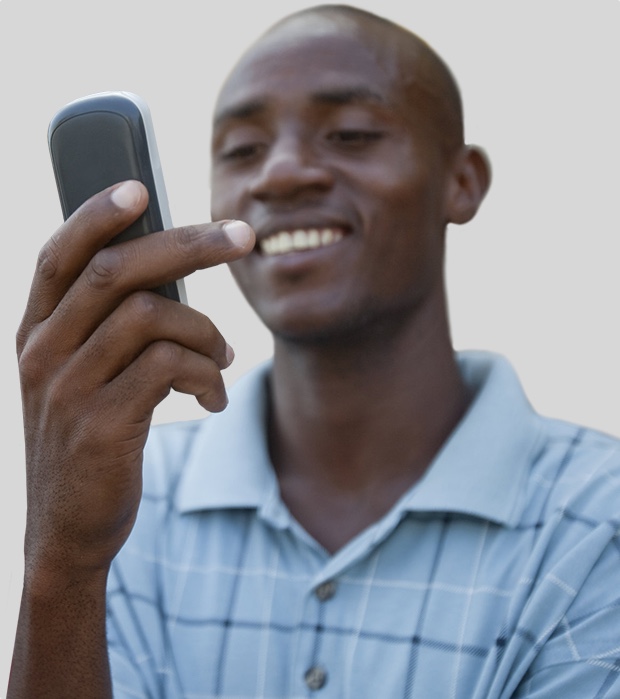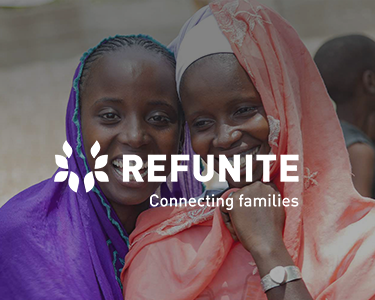
March 24, 2014 — “Radio has been my dream since I began working on my undergraduate degree,” Audrey Wabwire says. She flashes an infectious smile, her blue nail polish glistening as her hand trails through the air. “I loved it so much – I could create so many things and reach people who lived in places I’d never been.”
Audrey is an immediately inviting personality, smiling warmly over her cappuccino as she recalls the professional and academic path she’s followed to arrive as Refugees United’s Radio Producer based in Nairobi, Kenya, where she is closing in on her two-year anniversary. Beneath her welcoming openness, she speaks with purpose and conviction about radio’s power to reconnect separated families.
As a student at Catholic University in Nairobi, Kenya, Audrey worked as a radio journalist, where she focused on news and features but somewhere along the way, Audrey’s vision for radio broadened. “It was once I’d worked so hard, once I’d perfected my knowledge of radio that I began to think there might be more – that maybe it was time for me to stop entertaining and start using radio as a tool for good. Refugees United gave me the opportunity to do that.”
Now a Master’s student in International Relations at United States International University, Audrey has produced a wide range of radio shows for Refugees United, including live broadcasts from camps, interviews with reconnected families and community leaders, dramas and live shows. “Radio is especially important in Africa,” she explains, “because it’s the simplest medium you can use to reach the most people. It’s popular and familiar. Oftentimes, refugees have no other source of news.”
Since 2012, Refugees United has launched more than 20 radio campaigns to reach families living in refugee camps and refugee prone areas, such as Dadaab and Kakuma refugee camps in Kenya, and the Goma region in Democratic Republic of the Congo. Overall, the campaigns aim to inspire separated families to register and search for their missing loved ones, using Refugees United’s free mobile application and free help lines.
This kind of information is key in conflict-riddled countries, where radio is often the only medium through which people receive news. Internews, an international NGO that fosters independent media, recently found that in South Sudan radio was by far the most accessible form of access to information. In the Democratic Republic of the Congo, Internews also identified community radio as an opportunity to convey information to vulnerable populations.
“If you want to reconnect families, you have to establish a level of comfort. Radio is familiar – you can make people laugh, make people think,” Audrey says. “Suddenly our mobile platform becomes something they understand. It’s more than just a cloud in the air – it’s an application that real people, just like them, have used to search, connect and communicate.”
Audrey is especially attuned to the needs of young refugees. “Many of the refugees we work with left their homes when they were very young. Radio is one of the only sources of media they have. That means that the information we put in our campaigns – whether it is about our mobile application or our toll free help line – must be engaging and compelling.”
Audrey reflects on her favorite project so far – an outreach campaign run in the world’s biggest refugee camp, Dadaab Refugee Camp in Kenya. The campaign with DadaabFM featured not only the traditional information blasts but also a live door-to-door registration campaign led by volunteers from Refugees United and Kenya Red Cross Society. All their conversations with families aired on the radio. The radio campaigns run from Dadaab inspire community-wide excitement that Audrey describes with special enthusiasm.
“We have a reporter go around, describing where they are, and people call in and say ‘I’m in the same place!’” Audrey laughs happily. “You can hear the excitement – the crowd following them, the noises. It’s exciting to see an example of the whole community participating in efforts to help people, to reach people, and to reconnect families.”
Audrey’s commitment to radio work has only deepened with time, education, and experience.
“My dream when I was a little girl was to do radio features. Now I’ve done that! So I have to keep on living, keeping on striving for new goals.”
These new goals align with Audrey’s personal motto: “Try to get along,” she says, grinning with optimism.
Towards that end, she’s refined her professional goals to promote tolerance throughout Africa.
“I really want to tell stories around the continent that provide different opinions about refugees and things that are taboo or misunderstood – cultural traditions, economic beliefs, religion. Through radio, we can build tolerance and understanding between different ethnic communities across Africa, “ Audrey says, serious for a moment before a small, hopeful laugh escapes her lips.
By Carolyn Nash, Communications Coordinator for Refugees United (cn@refunite.org).


